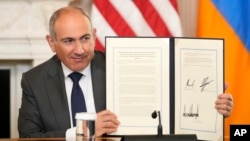The agreement, reached during U.S.-hosted negotiations on August 8, grants the United States exclusive rights to oversee the implementation of a transit road through Armenia’s southern Syunik province. The road is intended to provide unimpeded connectivity between mainland Azerbaijan and its western Nakhichevan exclave “with reciprocal benefits for international and intra-state connectivity for the Republic of Armenia.”
Opposition groups in Armenia criticized the agreement, calling it a concession to Azerbaijan and raising doubts about its potential to secure lasting peace in the South Caucasus.
Answering questions from the media hours after the signing of the joint declaration at the White House, Pashinian said the document did not include technical details but emphasized that all future solutions must align with the principles of sovereignty, territorial integrity, and jurisdiction of the States.
Pashinian said the inclusion of such wording, along with Trump’s verbal reiteration of the same principles, addressed public concerns over the implications of the transit project.
“We have not gone into details at this stage,” Pashinian said. “But whatever the solutions that we will discuss are, they must be within the principles of sovereignty, jurisdiction, territorial integrity, and inviolability of borders and be applied on the basis of reciprocity.”
At the same time, he did not rule out the use of advanced border technologies to reduce contact with entities using the transit route.
Pashinian described the Washington agreement as a historic opportunity for Armenia, stating it would unlock regional trade routes and deliver economic and security benefits.
“We are getting a railway connection with the Islamic Republic of Iran, which is very important. We are getting a railway connection with Central Asia, through a ferry line. Also, China is getting a new railway route to the West, which it does not have at the moment,” he said, suggesting that the project could create opportunities for broader international cooperation, including between Iran and the United States, and Russia and the United States.
Pashinian added that the project, dubbed the Trump Route for International Peace and Prosperity (TRIPP), has no military component and poses no threat to Iran.
Opposition figures in Armenia have voiced strong objections to the agreement, warning that it effectively creates an extraterritorial corridor through Armenian territory — a claim the government denies.
Tigran Abrahamian, a member of the opposition Pativ Unem faction in parliament, questioned the special status of the 43-kilometer section of the road crossing Syunik.
“No matter how hard the sides try to show that this is not about a corridor, given everything that is taking place on the ground and is being presented, it can be more viewed within the corridor logic than the logic of a regular road,” Abrahamian told RFE/RL’s Armenian Service.
Kristine Vardanian, of the opposition Hayastan faction, argued the agreement strengthens the positions of Azerbaijan and the United States, while Armenia’s gains remain questionable.
“The fact is that Aliyev has got what he demanded: an unimpeded connectivity through Armenian territory, as stated in the joint trilateral declaration, as well as a [joint] application to dissolve the Organization for Security and Cooperation in Europe’s Minsk Group,” Vardanian said, referring to the only international mediating body, spearheaded by the United States, France, and Russia, that had for decades sought a negotiated settlement of the Armenian-Azerbaijani conflict over Nagorno-Karabakh.
“The American side gained an image advantage, appearing as the party bringing peace to the region. And Armenia in fact once again gains nothing, which is why we are talking about unilateral concessions,” the opposition lawmaker added.
Edmon Marukian, leader of the extra-parliamentary Bright Armenia party and a former ambassador-at-large in the Pashinian administration, also voiced criticism of the agreement. He noted that the transit arrangement was signed not only with the United States but also with Azerbaijan, arguing that this effectively gives Baku a role in the infrastructure passing through Armenian territory.
“This means that the Republic of Armenia makes the state of Azerbaijan a stakeholder on the communication passing through its territory, and it is not defined under any norm of our Constitution, our legislation, and it is impossible to imagine even in the worst nightmare,” Marukian said.





Facebook Forum